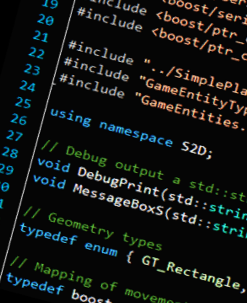Addresses and Nodes: Two Ways To Get Around -- Andrew Koenig
 Continuing Koenig's series on move semantics:
Continuing Koenig's series on move semantics:
Addresses and Nodes: Two Ways To Get Around
by Andrew Koenig
From the article:
Programs that avoid address arithmetic can also avoid moving data. The reason is that it is only arithmetic that really cares about where in memory an object is; in other circumstances, having a pointer to that memory is enough.

 I've been looking at the BlackBerry 10 NDK the last weeks, and did write about it to share some thoughts and results.
I've been looking at the BlackBerry 10 NDK the last weeks, and did write about it to share some thoughts and results. Danny Kalev wrote a nice article yesterday about a new C++ feature -- actually, two related C++14 features -- that were just added to the draft Standard in April and will be coming to real compilers in the near future.
Danny Kalev wrote a nice article yesterday about a new C++ feature -- actually, two related C++14 features -- that were just added to the draft Standard in April and will be coming to real compilers in the near future. We keep hearing about C++'s "as if" rule, but what does it really do? Fundamentally, it enables optimizations. A modern compiler never produces an executable that's identical to the program you actually wrote; it produces an equivalent program that's probably a lot better.
We keep hearing about C++'s "as if" rule, but what does it really do? Fundamentally, it enables optimizations. A modern compiler never produces an executable that's identical to the program you actually wrote; it produces an equivalent program that's probably a lot better. A nice piece of writing on a C++11 feature:
A nice piece of writing on a C++11 feature: Here is a nicely accessible description of synchronization in the C++ memory model:
Here is a nicely accessible description of synchronization in the C++ memory model: On CRTP with multi-level inheritance, cloning, and the constructor forwarding problem.
On CRTP with multi-level inheritance, cloning, and the constructor forwarding problem. Today on Dr. Dobb's:
Today on Dr. Dobb's: